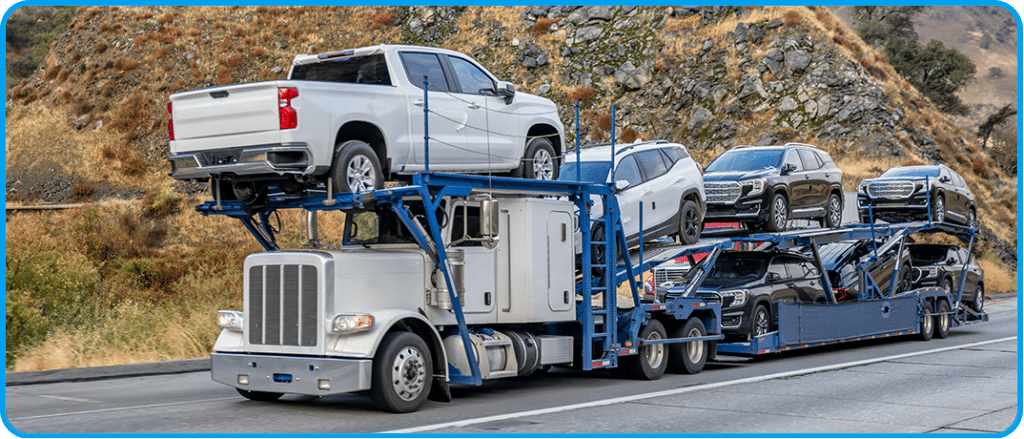How much does car shipping cost?
Car shipping costs in 2024, specifically for open car shipping, are estimated around $1.85/mile for short distances (1-500 miles) or $555 for a 300-mile trip. Medium distances average about $.91/mile (500-1500 miles) or $910 for 1000 miles. Long distances (1500+ miles) are about $.59/mile or $1,180 for a 2000-mile trip. It’s important to note that car shipping costs may vary and the rates for enclosed car shipping will be higher.
When it comes to shipping your vehicle, there are several factors that come into play when determining the cost. Everything from the type of vehicle you’re shipping to the type of shipping method you choose will affect the price.
To get a clear idea of what your final cost will be, we recommend using our free instant quote calculator for an estimate. You can also speak with a JRS Freight representative via live chat or at (888) 666-8929 to discuss your shipment and request a quote. This will give
you the most accurate estimate possible, taking into account factors such as the distance of the shipment, seasonal demand, any additional services required and current market
rates.
| Average car shipping cost per mile | |||
|---|---|---|---|
| Distance | Open transport | Enclosed transport | |
| 1-500 miles | $1.85/mile | $2.53/mile | |
| 501-1,500 miles | $.91/mile | $1.25/mile | |
| 1,500+ miles | $.59/mile | $.84/mile | |

What is car transport?
Car transport or car shipping, is a service that moves cars from one destination to another. The best car transport involves licensed professionals with the right experience and equipment to safely move your vehicle. The type of transport you choose will affect your car shipping cost. You can ship via open transport (more cost effective) or enclosed transport (more protection). Typically, enclosed auto transport will cost 10-40% more than open transport. Open transport is the most common type of transport, used by most customers, including car dealerships. Enclosed transport is the preferred method for anyone shipping luxury, exotic or collector vehicles that want added protection.
How to get a car transport quote
Car transport quotes can be calculated a few different ways. You can get an accurate estimate of your car shipping by using our instant quote calculator or speaking with a JRS Freight representative via live chat. When discussing your shipment be sure to mention any special requirements you may have, as these could affect the price. Some examples of special requirements include expedited pickup, vehicle modifications or inoperable vehicles.
In order to get the most accurate and up-to-date car shipping quote, it’s important to know and have the following information available:
- Vehicle pickup and delivery destinations (zip codes are preferred for increased quoting accuracy)
- Car transport preference (open or enclosed trailer)
- Vehicle year, make and model (ensures availability of required transport trailer size)
- Operational status (can be driven forward and in reverse, with basic steering for truck loading and unloading)
- Earliest available pickup date


Auto transport industry overview
There are three types of companies you might work with to ship your vehicle: lead providers, carriers and brokers.
In exchange for providing your contact information, lead providers supply vehicle owners with a list of “leads” or potential carriers, based on the owner’s search criteria. The owner is responsible from there to further research or contact the carriers on the list to determine the best option for their needs and budget. Lead providers will typically share your contact information with their network, so you will likely receive phone calls and emails from the various transport companies.
Carriers employ the truckers who do the actual transportation of your car, picking it up and dropping it off at the designated locations. You can work directly with a carrier company—from requesting a quote for shipment, to working out details, to the actual transport—but without some industry knowledge it can be hard to identify the best carrier for your unique vehicle shipment. This is why you might choose to work with an auto transport broker. Brokers work as the middle man between vehicle owners and a network of carriers, finding the best-suited solution for the highest value.
Calculating car shipping costs
Auto transport quotes and car shipment rates are calculated using unique considerations for each customer. Your car shipping estimate will be based on several different transport factors. This includes, but isn’t limited to: trip distance, car size (sedan, pickup truck, SUV, etc.), vehicle condition (operable or inoperable), transport type (open or enclosed), location (i.e. rural or urban) and the time of year you ship. JRS Freight instant quote calculator lets you enter all the details about your vehicle, allowing us to generate the most accurate and cost-optimized price—without hidden fees.

How to use the JRS Freight car shipping cost calculator
Our free instant quote calculator provides accurate car shipping costs for your vehicle shipment in just a few clicks. Complete the steps below and instantly receive your quote, no credit card or upfront payment is required. Provide as much detail about your vehicle and shipping needs for the most accurate estimate.
The car transport process
What factors are used to calculate the cost of car shipping?
Why choose JRS Freight?
JRS Freight Auto Transport delivers a balance of quality and affordability. Our transparent approach to car shipping costs ensures you receive an accurate quote from the beginning. By leveraging our extensive network and industry expertise, we secure the best price for your vehicle’s journey so you can plan your move confidently.
Auto transport insurance
Auto transport companies are held to stringent insurance requirements. Carrier companies are legally required to carry liability insurance and a minimal level of cargo insurance. Auto transport brokers can inform you of your carrier’s amount of coverage. When determining insurance coverage, ask your JRS Freight representative these questions:
- What type of damage is covered?
- Does insurance cover the entire vehicle or only specific parts? – Is there a deductible?
- Is there a deductible?
- What is the limit of coverage?
- Are specialty items or accessories covered?
- Is there an option to purchase additional coverage?





















